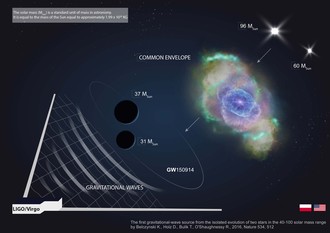Krzysztof Belczyński from the Nicolaus Copernicus Astronomical Center is the laureate of the Scientific Maria Skłodowska-Curie Award, awarded by Polish Academy of Sciences. These awards are given for "outstanding scientific achievements contributing to increasing importance of Polish science in the world."
Krzysztof Belczyński was awarded for "explaining the frequency of occurrence, masses and speed of rotation of black holes, detected in gravitational waves ".
The team of prof. Belczyński created a synthetic model of the Universe allowing for a global evaluation of the evolution of binary star systems that are potential wave source progenitors. He proposed that the most common detections of gravitational waves would come from collisions of black holes with previously unknown masses that can reach 100 times the mass of the Sun.
After the first detection of gravitational waves (for which the Nobel Prize was awarded in 2017), which arose during the collision of two black holes with masses of 30 solar masses, prof. Belczyński (Nature, June 2016: "The first gravitational-wave source from the isolated evolution of two stars in the 40-100 solar mass range ") described and explained the origin of such a system of two black holes. His team demonstrated that to generate such massive black holes stellar systems they must originate from the distant past, when the Universe was still poor in heavy elements. Hevy elements increase the opacity in stellar atmospheres which drives the stellar wind away (effectively reducing the mass of the stars) and reduces the formation of massive black holes. This work wreached over half a thousand citations.
Prof. Belczynski has been the leader of many research projects, including the program Master of the Foundation for Polish Science or the Maestro program of the National Science Center. He has also been honored with various awards, such as the Individual Scientific Award of the Rector of the University of Warsaw, the Award for the Results in Teaching at the Faculty of Physics, University of Warsaw, Distinguished Visitor Fellowship issued by of the director of LIGO, prof. David Reitze, Distinguished Visitor Program invited via Australian National University Canberra, Polish Physical Society Award, Gruber Cosmology Prize in Physics, Special Breakthrough Prize in Physics (the last 3 within the LIGO / Virgo group first detection of gravitational waves).
Scientific achievements of prof. Belczynski is well summarized by the publication statistics; over 300 publications that collected over 26,000 citations. Of which about 50 are works with over 100 citations, and 70 works as a first author. Hirsch index: 71.

caption: Two massive stars (96 Msun and 60 Msun) in a binary system evolve through common envelope phase and form a close double black hole system with two massive black holes (37 Msun and 31 Msun). Merger of two such black holes (GW150914) was a source of first ever detected gravitational waves by LIGO/Virgo observatories.






